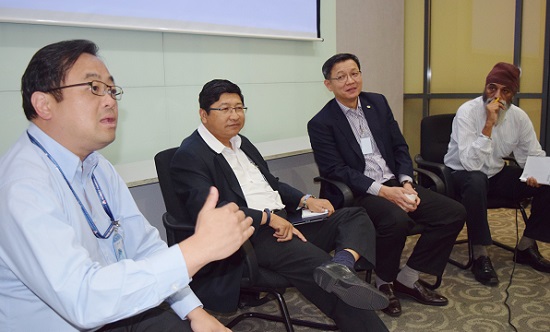Disrupt: Batten down the hatches, gonna be a bad year
By A. Asohan January 22, 2015
- Triple-play threat: Currency exchange rates, GST, and plunging oil prices
- ‘Keeping the lights on’ IT will be hit, strategic IT spending probably not affected

MALAYSIA is going to be hit by a macro-economic triple-whammy this year that is going to create an adverse impact on the economy and affect IT spending patterns, warned the speakers at the Jan 21 DNA-TeAM Disrupt panel discussion.
“It’s going to be a very challenging year for Malaysia, given the implementation of the Goods and Services Tax (GST), the currency exchange rate, and falling oil prices,” said Hitachi Sunway Information Systems group chief executive officer and director Cheah Kok Hoong.
“At this time, it’s hard to determine the impact of all these issues on the IT industry, but given the Prime Minister’s announcement that the Government is cutting spending, we can expect that 2015 is going to be a very severe year,” he added.
On Jan 20, Prime Minister Najib Razak announced a host of reductions to Budget 2015 in the face of oil prices dropping by more than half since last year, which will cut government revenue by RM8.3 billion (US$2.3 billion), according to The Malay Mail Online.
Among other measures, Najib said the Government will postpone RM300 million (US$83 million) worth of purchases of non-critical assets for the civil service, especially items such as office equipment, software and vehicles.
Meanwhile, Malaysia is on track to roll out the GST on April 1, and this has become a political hot-button issue, with the Federal Opposition coalition Pakatan Rakyat urging the Government to at least postpone the implementation of the new tax regime to reduce the burden on the people.
The Disrupt panellists however believe that the GST is essential to reduce the country’s budget deficit, thus strengthening Malaysia’s fundamentals and improving its sovereign ratings. This would help strengthen its currency and attract more foreign direct investments.
While there will be an immediate impact on consumer spending at the onset of GST, this will eventually normalise as the supply and demand adjusts over time, the panellists said.
Fitch Ratings downgraded Malaysia’s sovereign credit rating in 2013, and it is expected to do so again in June this year.
“It’s going to be a tough year, so batten down the hatches and ride it out,” said Victor Khor, executive vice president and head of Group Transaction and Alternate Banking at the Alliance Banking Group.
Not all gloomy
DNA-TeAM Disrupt is a monthly panel discussion and networking session organised by Digital News Asia (DNA) and the Technopreneurs Association of Malaysia (TeAM).
The Jan 21 panel discussion, which was moderated by DNA founder Karamjit Singh, had as its topic ‘Hot Enterprise Tech Trends of 2015,’ and the economic situation was perhaps the hottest subject discussed.
Still, the panellists offered a glimmer of hope: The gloomy outlook doesn’t mean businesses will just stop spending on technology, or that they will blindly slash their IT budgets.
“We don’t really differentiate between ‘IT budgets’ and ‘business budgets.’ Generally, across the board, we need to spend what we need to spend,” said Khor.
“So if I look at so-called tightening the purse-strings, we always first look at the ‘nice-to-haves.’ We never cut down on strategic IT – you’re just not going to shut down your critical servers.
“I don’t want to speak for the rest of the industry, but I’m pretty sure that 2015 will be a year where spending on new and nice-to-have things will slow down. It’s always been like that.
“Personally, I have set aside a big budget to spend on security – I have to, I will not compromise on security, compliance, or risk management,” he added. “But you’d have another thing coming if you tell me to try that latest gadget.”
Andy Tan, group chief information officer of the RHB Banking Group, largely concurred. “We will probably be reviewing some of our initiatives,” he said.
“If you don’t expect the business to grow, then you will need to do some cost-cutting – but at the end of the day, it’s not just about strategic direction because if you don’t have the resources, you will need to review your initiatives.
“We’re expected to do more with less. Even with our grand plans (at RHB), I am still expected to do cost-cutting – but having said that, I can cut the traditional areas, and I can still get the budget for any area related to transforming the business.
“As long as the ROI (return on investment) is there, we’re willing to spend – it’s the ‘keeping the lights on’ type of IT that we’re expected to cut – which is why we need expedite our virtualisation drive,” he added.
According to Tan, about 20% of the banking group’s IT infrastructure now has already been virtualised.
“And we’re coming out with a blueprint, and part of that blueprint is that anything that can be virtualised, has to be virtualised. We have a virtualise-first policy,” he added.
Still, Alliance Banking Group’s Khor countered: “I don’t think you can use the phrase ‘your budget gets cut’ because it just doesn’t work that way – but every allocation will be evaluated on a project basis.
“Some critical areas will not be cut because you won’t be cutting away the fat, but cutting away the muscle and bones [of your operation],” he added.
… and now, the trends

Hitachi Sunway’s Cheah, also the chairman of the National ICT Association of Malaysia or Pikom, said that the top enterprise technology trends for 2015 could be perfectly summed up by the phrase coined by research and analyst firm Gartner Inc: The Nexus of Forces.
“It’s really about cloud computing, social media, mobility and big data [analytics],” he said. “I would like add a fifth one to that, and that’s cybersecurity.”
Tan concurred: “The traditional, conventional way of handling security is no longer viable. Threats can be internal or external, so you must have the ability to fend these off.”
Tan said that his banking group embarked on a transformation initiative last year, called Ignite 2017, aimed at propelling RHB into one of the top three banks in the country and within the top eight in the region.
“IT vendors can smell blood,” he said. “We will be making a lot of heavy investments in IT. The key theme of Ignite 2017 is digital business. It’s what everyone is talking about these days anyway. The Internet, mobile and the Internet of Things (IoT) are driving this.
“(It’s the era of) global citizens. People travel a lot these days, and they don’t use only one device. They expect a banking group like us to be able to service them anytime, anywhere, anyhow,” he added.
But when talking about becoming a digital business, the organisation first has to get its internal operations right.
“For a bank, straight-through processing is fundamental,” he said, referring to the financial services industry term for optimising the speed at which transactions are processed.
“You can’t put lipstick on a pig – you need to get your business’ internal operations right first before putting your business on the Internet.
“And one of the things we have learned today is, don’t try and do everything yourself. People are talking about integrating with market players and crowdsourcing; it’s no longer viable for organisations to work in silos. You have to work with partners, and even competitors sometimes,” he added.
To support this, Tan said banks are looking at ‘advanced, invisible, pervasive analytics,’ which Gartner has ranked as the No 4 top technology trend for 2015, where every app needs to be an analytics app, and where analytics will become deeply, but invisibly embedded everywhere.
“In banking, we’d like to address the ‘market of one,’ where we can understand the banking needs of individual customers,” said Tan.
“Another area is that IT must enable the organisation to be agile, in terms of software development, and in terms of infrastructure to enable the adoption of emergent technologies such as on-demand computing.
“I am not saying we’re there yet, but these are the areas we’re moving towards,” he added.
 Startup opportunity
Startup opportunity
Latching on to his statement that banks today are looking to partner with others, a member of the audience challenged Tan, saying that banks are notorious for having a high barrier of entry when it came to working with startups.
Would RHB be looking at starting its own accelerator or incubator programme?
“Let me be frank: Banks are very prudent, so we don’t take risks,” Tan admitted.
“But having said that, I think the trend is changing. We’re also looking at non-traditional sources in moving us to the next level.
“We’re even toying with the idea of incubating leading-edge technologies, and usually, new startups are the ones which are good at that – but of course, you need to exhibit certain values and an understanding of our business.
“If you don’t understand business and only understand technology, how do you then position your solution?
“We’re game for this, don’t get me wrong, but there are certain areas in which we don’t gamble. We have a lot of regulatory compliance to adhere to, so we won’t gamble on unproven technology for critical functions.
“I always tell my vendor friends – go for a niche, where the big boys don’t play in yet. If you fight the big boys, you won’t have the financial muscle to compete with them.
“All that said, I think banks are slowly changing and are open to experimentation in some areas, like social banking,” Tan added.
Related Stories:
Banks in Malaysia face new threat … and opportunity: Accenture
Embrace changing trends or perish, says Gartner
Banking on Digital: Where conversion matters
For more technology news and the latest updates, follow us on Twitter, LinkedIn or Like us on Facebook.


